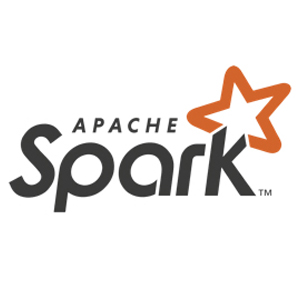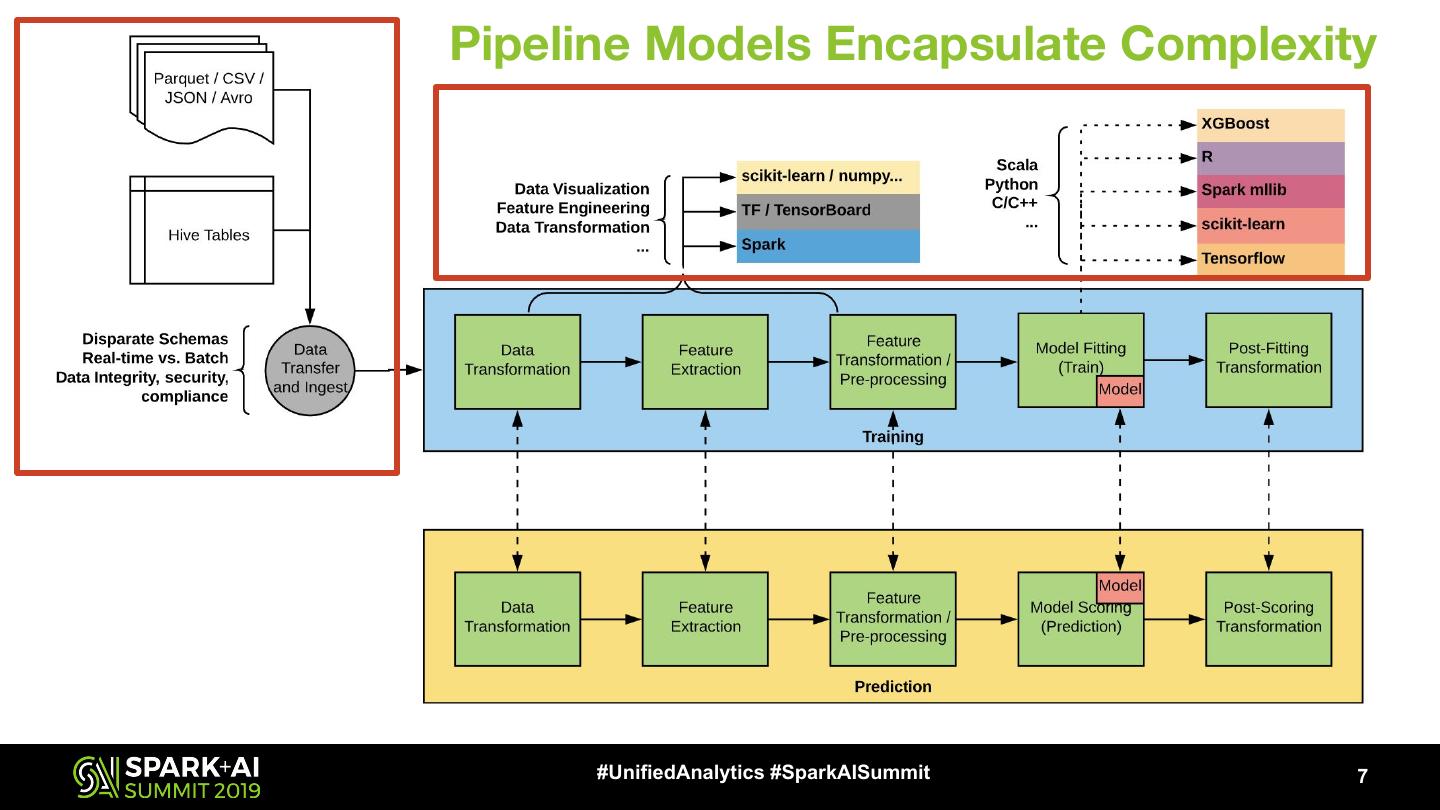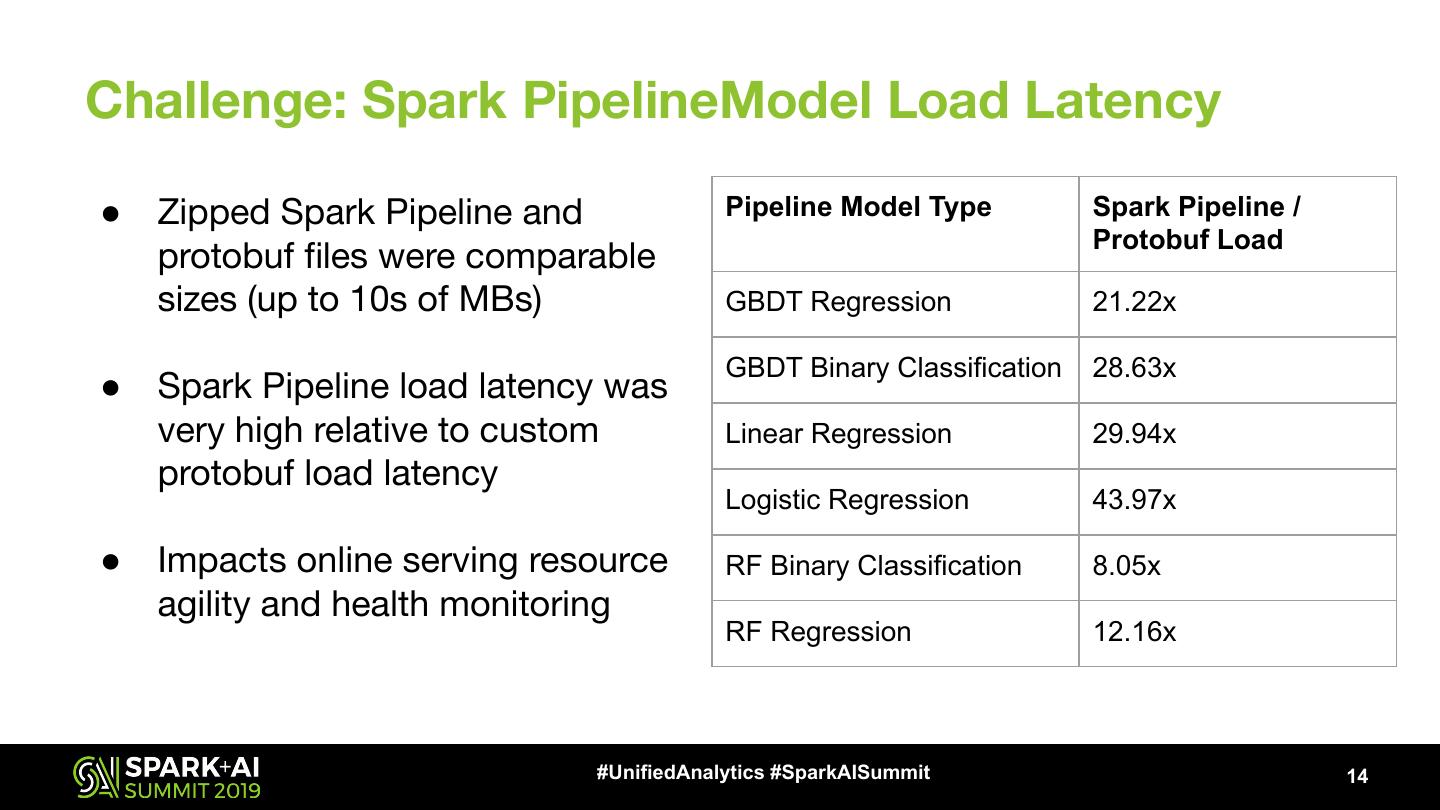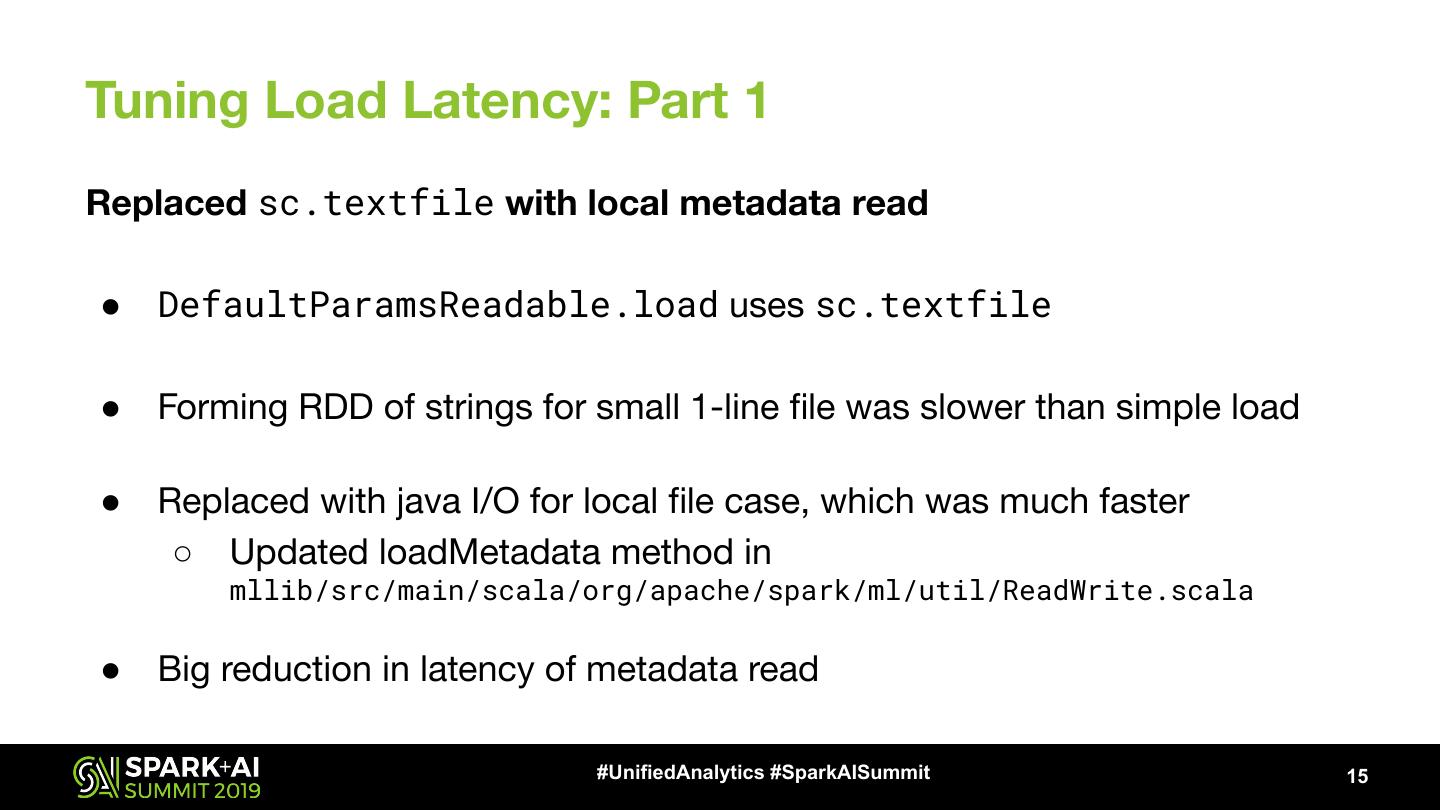- 快召唤伙伴们来围观吧
- 微博 QQ QQ空间 贴吧
- 文档嵌入链接
- <iframe src="https://www.slidestalk.com/Spark/Using_Spark_Mllib_Models_in_a_Production_Training_and_Serving?embed" frame border="0" width="640" height="360" scrolling="no" allowfullscreen="true">复制
- 微信扫一扫分享
Using Spark Mllib Models in a Production Training and Serving Platform: Experien
展开查看详情
1 .WIFI SSID:SparkAISummit | Password: UnifiedAnalytics
2 .Using Spark MLlib Models in a Production Training and Serving Platform: Experiences and Extensions Anne Holler, Michael Mui Uber #UnifiedAnalytics #SparkAISummit
3 .Introduction ● Michelangelo is Uber’s Machine Learning Platform ○ Supports training, evaluation, and serving of ML models in production ○ Uses Spark MLlib for training and serving at scale ● Michelangelo's use of Spark MLlib has evolved over time ○ Initially used as part of a monolithic training and serving platform, with hardcoded model pipeline stages saved/loaded from protobuf ○ Initially customized to support online serving, with online serving APIs added to Transformers ad hoc #UnifiedAnalytics #SparkAISummit 3
4 .What are Spark Pipelines: Estimators and Transformers Estimator: Spark abstraction of a learning algorithm or any algorithm that fits or trains on data Transformer: Spark abstraction of an ML model stage that includes feature transforms and predictors #UnifiedAnalytics #SparkAISummit 4
5 .Pipeline Models Encode Operational Steps #UnifiedAnalytics #SparkAISummit 5
6 .Pipeline Models Enforce Consistency ● Both Training and Serving involve pre- and post- transform stages in addition to raw fitting and inferencing from ML model that need to be consistent: ○ Data Transformations ○ Feature Extraction and Pre-Processing ○ ML Model Raw Predictions ○ Post-Prediction Transformations #UnifiedAnalytics #SparkAISummit 6
7 . Pipeline Models Encapsulate Complexity ML Workflow In Practice #UnifiedAnalytics #SparkAISummit 7
8 .Complexity arises from Different Workflow Needs #UnifiedAnalytics #SparkAISummit 8
9 . Complexity arises from Different User Needs Data Analysts / Data Engineers / Software Engineers Research Scientists / Data Scientists / Research/ML Engineers ML Engineers / Production Engineers #UnifiedAnalytics #SparkAISummit 9
10 .Evolution Goal: Retain Performance and Consistency ● Requirement 1: Performant distributed batch serving that comes with the DataFrame-based execution model on top of Spark’s SQL Engine ● Requirement 2: Low-latency (P99 latency <10ms), high throughput solution for real-time serving ● Requirement 3: Support consistency in batch and real-time prediction accuracy by running through common code paths whenever practical #UnifiedAnalytics #SparkAISummit 10
11 .Evolution Goal: Increase Flexibility and Velocity ● Requirement 1: Flexibility in model definitions: libraries, frameworks ○ Allow users to define model pipelines (custom Estimator/Transformer) ○ Train and serve those models efficiently ● Requirement 2: Flexibility in Michelangelo use ○ Decouple its monolithic structure into components ○ Allow interoperability with non-Michelangelo components / pipelines ● Requirement 3: Faster / Easier Spark upgrade path ○ Replace custom protobuf model representation ○ Formalize online serving APIs #UnifiedAnalytics #SparkAISummit 11
12 .Evolve: Replacing Protobuf Model Representation ● Considered MLeap, PMML, PFA, Spark PipelineModel: all supported in Spark MLlib ○ MLeap: non-standard, impacting interoperability w/ Spark compliant ser/de ○ MLeap, PMML, PFA: Lag in supporting new Spark Transformers ○ MLeap, PMML, PFA: Risk of inconsistent model training/serving behavior ● Wanted to choose Spark PipelineModel representation for Michelangelo models ○ Avoids above shortcomings ○ Provides simple interface for adding estimators/transformers ○ But has challenges in Online Serving (see Pentreath’s Spark Summit 2018 talk) ■ Spark MLlib PipelineModel load latency too large ■ Spark MLlib serving APIs too slow for online serving #UnifiedAnalytics #SparkAISummit 12
13 .Spark PipelineModel Representation ● Spark PipelineModel format example file structure ├── 0_strIdx_9ec54829bd7c │ ├── data part-00000-a9f31485-4200-4845-8977-8aec7fa03157.snappy.parquet │ ├── metadata part-00000 ├── 1_strIdx_5547304a5d3d │ ├── data part-00000-163942b9-a194-4023-b477-a5bfba236eb0.snappy.parquet │ ├── metadata part-00000 ├── 2_vecAssembler_29b5569f2d98 │ ├── metadata part-00000 ├── 3_glm_0b885f8f0843 │ ├── data part-00000-0ead8860-f596-475f-96f3-5b10515f075e.snappy.parquet │ └── metadata part-00000 └── 4_idxToStr_968f207b70f2 ├── metadata part-00000 ● Format Read/Written by Spark MLReadable/MLWritable trait MLReadable[T] { def read : org.apache.spark.ml.util.MLReader[T] def load(path : scala.Predef.String) : T } trait MLWritable { def write: org.apache.spark.ml.util.MLWriter def save(path : scala.Predef.String) } #UnifiedAnalytics #SparkAISummit 13
14 .Challenge: Spark PipelineModel Load Latency ● Zipped Spark Pipeline and Pipeline Model Type Spark Pipeline / Protobuf Load protobuf files were comparable sizes (up to 10s of MBs) GBDT Regression 21.22x GBDT Binary Classification 28.63x ● Spark Pipeline load latency was very high relative to custom Linear Regression 29.94x protobuf load latency Logistic Regression 43.97x ● Impacts online serving resource RF Binary Classification 8.05x agility and health monitoring RF Regression 12.16x #UnifiedAnalytics #SparkAISummit 14
15 .Tuning Load Latency: Part 1 Replaced sc.textfile with local metadata read ● DefaultParamsReadable.load uses sc.textfile ● Forming RDD of strings for small 1-line file was slower than simple load ● Replaced with java I/O for local file case, which was much faster ○ Updated loadMetadata method in mllib/src/main/scala/org/apache/spark/ml/util/ReadWrite.scala ● Big reduction in latency of metadata read #UnifiedAnalytics #SparkAISummit 15
16 .Tuning Load Latency: Part 2 Replaced sparkSession.read.parquet with ParquetUtil.read ● Spark distributed read/select for small Transformer data was very slow ● Replaced with direct parquet read/getRecord, which was much faster ○ Relevant to Transformers like LogisticRegression, StringIndexer, LinearRegression ● Significant reduction in latency of Transformer data read #UnifiedAnalytics #SparkAISummit 16
17 .Tuning Load Latency: Part 3 Updated Tree Ensemble model data save and load to use Parquet directly ● Coalesced tree ensemble node and metadata weights DataFrames at save time to avoid writing large number of small files that are slow to read ● Loading Tree Ensemble models invoked a groupByKey,sortByKey ○ Spark distributed read/select/sort/collect was very slow ● Replaced with direct parquet read/getRecord, which was much faster ● Significant reduction in latency of tree ensemble data read #UnifiedAnalytics #SparkAISummit 17
18 .Before and After: Tuned Pipeline Load Latency Pipeline Model Type Spark Pipeline / Tuned Spark Greatly improved MLLib load Protobuf Load Pipeline / Protobuf latency, while retaining Load current on-disk format! GBDT Regression 21.22x 2.05x GBDT Binary 28.63x 2.50x Classification Linear Regression 29.94x 2.03x Logistic Regression 43.97x 2.88x RF Binary Classification 8.05x 3.14x RF Regression 12.16x 3.01x #UnifiedAnalytics #SparkAISummit 18
19 .Challenge: SparkContext Cleaner Performance ● Michelangelo online serving creates local SparkContext to handle load of any unoptimized Transformers ● Periodic context cleaner runs induced non-trivial latency in serving request responses ● Solution: Stopped SparkContext when models not actively being loaded. ○ Model load only happens at service startup or when new models are deployed into production online serving #UnifiedAnalytics #SparkAISummit 19
20 .Challenge: Serving APIs too slow for online serving ● Added OnlineTransformer trait to Transformers to be served online ○ Single & small list APIs which leverage low-level spark predict methods trait OnlineTransformer { def scoreInstances(instances: List[Map[String, Any]]): List[Map[String, Any]] def scoreInstance(instance: Map[String, Any]): Map[String, Any] } ○ Injected at Transformer load time, so pipeline models trained outside of Michelangelo can be served online by Michelangelo #UnifiedAnalytics #SparkAISummit 20
21 .Michelangelo Use of Spark MLlib Evolution Outcome ● Michelangelo is using updated Spark MLlib interface in production ○ Spark PipelineModel on-disk representation ○ Optimized Transformer loads to support online serving ○ OnlineTransformer trait to provide online serving APIs #UnifiedAnalytics #SparkAISummit 21
22 .Example Use Cases Enabled by Evolved MA MLlib ● Flexible Pipeline Model Definition ○ Model Pipeline including TFTransformer ● Flexible Use of Michelangelo ○ Train Model in Notebook, Serve Model in Michelangelo #UnifiedAnalytics #SparkAISummit 22
23 .Flexible Pipeline Model Definition ● Interoperability with non-Michelangelo components / pipelines ○ Cross framework, system, language support via Estimators / Transformers ● Allow customizability of PipelineModel, Estimators, Transformers while fully integrated into Michelangelo’s Training and Serving infrastructure ○ Combines Spark’s Data Processing with Training using custom libraries e.g. XGBoost, Tensorflow #UnifiedAnalytics #SparkAISummit 23
24 .Flexible Pipeline Definition Example: TFTransformer ● Serving TensorFlow Models with TFTransformer https://eng.uber.com/cota-v2/ ○ Spark Pipeline built from training contains both data processing transformers and TensorFlow transformations (TFTransformer) ○ P95 serving latency < 10ms ○ Combines the distributed computation of Spark and low-latency serving using CPUs and the acceleration of DL training using GPUs #UnifiedAnalytics #SparkAISummit 24
25 .Serving TF Models using TFTransformer #UnifiedAnalytics #SparkAISummit 25
26 .Flexible Use Example: Train in DSW, Serve in MA ● Decouple Michelangelo into functional components ● Consolidate custom data processing, feature engineering, model definition, train, and serve around notebook environments (DSW) #UnifiedAnalytics #SparkAISummit 26
27 .Experiment in DSW, Serve in Michelangelo #UnifiedAnalytics #SparkAISummit 27
28 .Key Learnings in Evolving Michelangelo ● Pipeline representation of models is powerful ○ Encodes all steps in operational modeling ○ Enforces consistency between training and serving ● Pipeline representation of models needs to be flexible ○ Model pipeline can encapsulate complex stages ○ Complexity stems from differing workflow and user needs #UnifiedAnalytics #SparkAISummit 28
29 .Conclusion ● Michelangelo updated use of Spark MLlib is working well in production ● Propose to open source our changes to Spark MLlib ○ Submitted Spark MLlib Online Serving SPIP ■ https://issues.apache.org/jira/browse/SPARK-26247 ○ Posted 2 patches ■ Patch to reduce spark pipeline load latency ■ Patch to add OnlineTransformer trait for online serving APIs #UnifiedAnalytics #SparkAISummit 29





































